Page 1 of 1
Article courtesy of Fisher & Phillips
As the weather gets warmer and you shift your focus to seasonal hiring, you’ll want to be sure to connect with Gen Z applicants, many of whom are college and high school students in search of summer jobs. These workers are “digital natives” who grew up with technology and social media, and as a result, have their own work preferences, influences, and slang that can be somewhat baffling to outsiders. Do you want to bridge the generational divide and create a welcoming and legally compliant workplace for all? Here’s your guide to hiring Gen Z this summer.
Gen Z Has Clocked In – and They Have Notes!
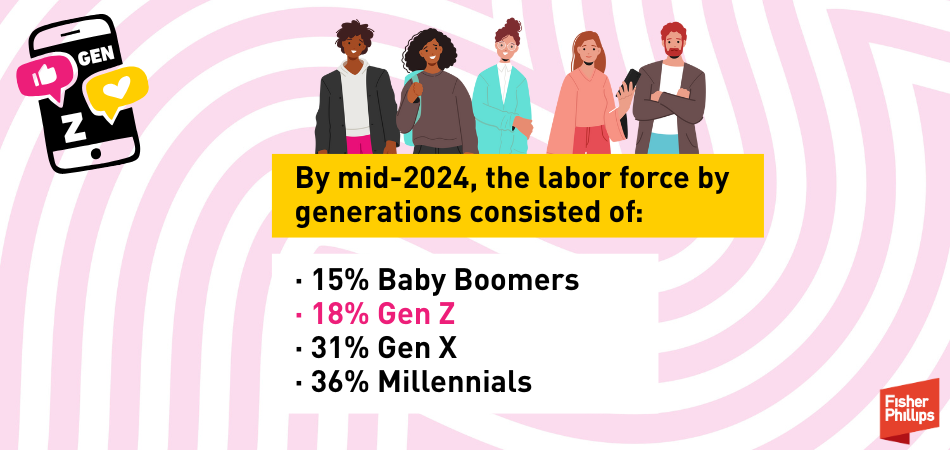
Gen Z is generally defined as people born between 1997 and 2012, which means members of this generation will turn 13 to 28 this year – and their presence in the workplace is growing rapidly. According to data from the U.S. Department of Labor, Gen Z surpassed Baby Boomers in the workforce for the first time in 2023. By mid-2024, the labor force by generations consisted of:
This means your hiring managers will want to understand what motivates Gen Z and what keeps them engaged. Here are six major points to keep in mind – with the caveat that every individual is different, some attributes are based on life-stage, and others are applicable to everyone, regardless of generation.
1. Sus Emails Are Not the Vibe – PERIODT
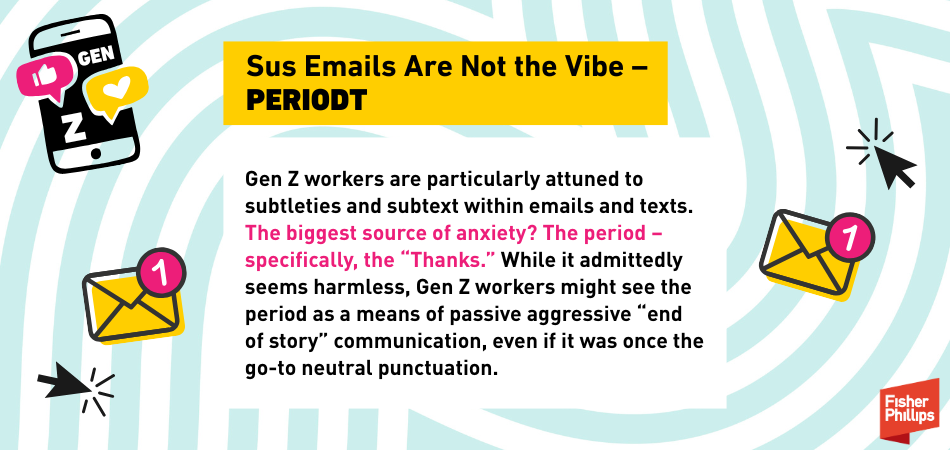
Gen Z has been communicating electronically since the womb, essentially. This means Gen Z workers are particularly attuned to subtleties and subtext within emails and texts. The biggest source of anxiety? The period – specifically, the “Thanks.” While it admittedly seems harmless, Gen Z workers might see the period as a means of passive aggressive “end of story” communication, even if it was once the go-to neutral punctuation. Using more exclamation points in communication might seem excessive to other generations, but it could make your newer Gen Z employees feel welcome and mitigate unnecessary stressors.
2. When We Excel, Let Us Know!
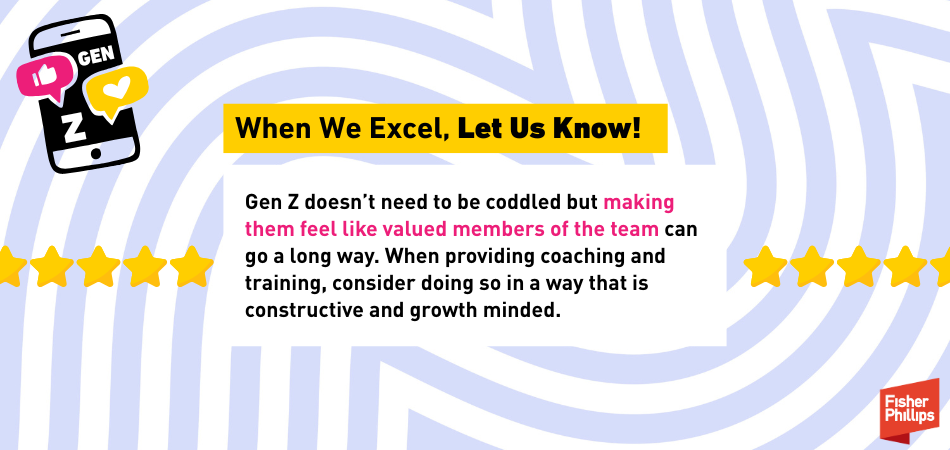
Gen Z doesn’t need to be coddled but making them feel like valued members of the team can go a long way. When providing coaching and training, consider doing so in a way that is constructive and growth minded. Everyone likes to know that the work they do is seen and appreciated. Even when feedback is negative, being thoughtful and constructive can encourage a team-oriented mindset that will help build confidence and ultimately lead to better work product.
3. Fully Remote Work Can Be Pretty Mid
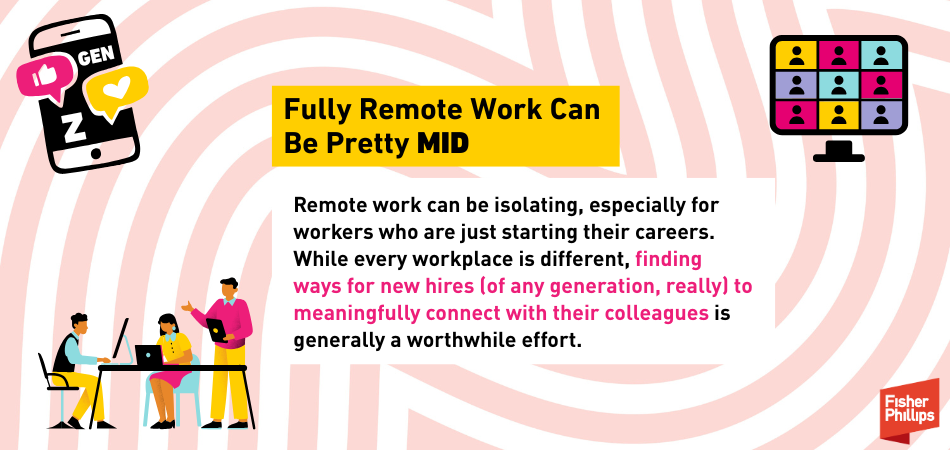
COVID-19 may be in the rearview mirror, but it has forever changed the way we work. While Gen Z workers don’t necessarily want to be in the office five days a week, having a fully remote workforce also poses challenges. Remote work can be isolating, especially for workers who are just starting their careers. While every workplace is different, finding ways for new hires (of any generation, really) to meaningfully connect with their colleagues is generally a worthwhile effort. Consider developing mentorship pairings, hosting in-person social events, and taking an extra minute at the end of the day to check-in 1:1. This can help foster a sense of camaraderie that, in turn, produces better work. Plus, this is a great opportunity to make Gen Z workers feel like they are respected members of the team and to boost your retention efforts.
4. Lacking Work-Life Boundaries is Cringe
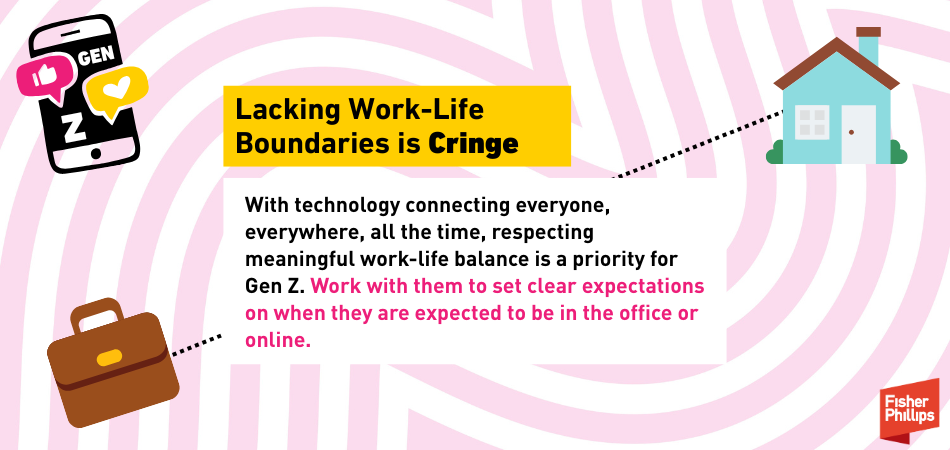
With technology connecting everyone, everywhere, all the time, respecting meaningful work-life balance is a priority for Gen Z. Simple things like delaying send on what would otherwise be a midnight email – or making it clear that workers are not obligated to respond after hours – can make a big difference. Work with them to set clear expectations on when they are expected to be in the office or online.
5. We Care About the Brand
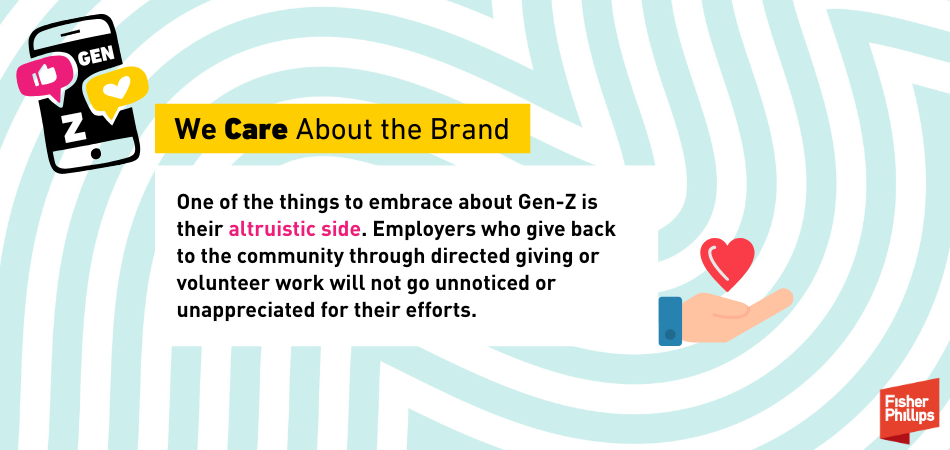
One of the things to embrace about Gen-Z is their altruistic side. Employers who give back to the community through directed giving or volunteer work will not go unnoticed or unappreciated for their efforts. Engaging your new hires in these activities is also an excellent team-building opportunity.
6. There are Pros and Cons to Being Chronically Online
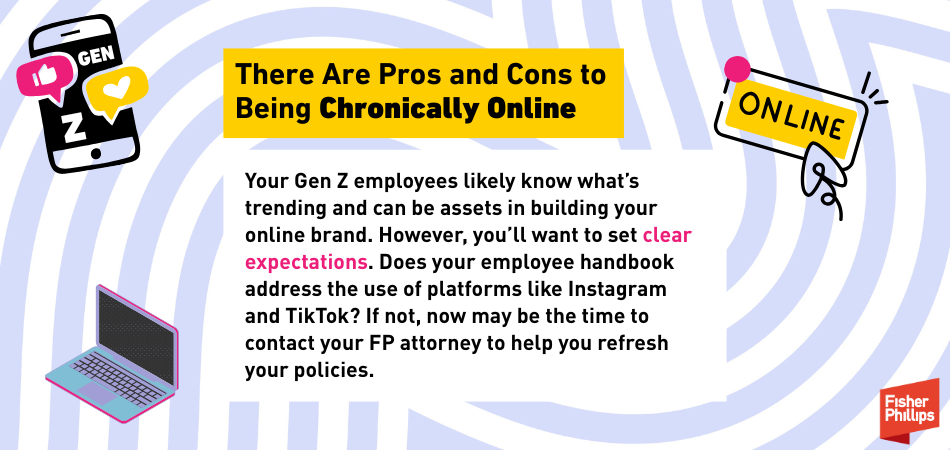
The association of Gen Z with social media is unavoidable. There can be incredible opportunity in wielding social media to your advantage. Your Gen Z employees likely know what’s trending and can be assets in building your online brand. However, you’ll want to set clear expectations. Does your employee handbook address the use of social media platforms? If not, now may be the time to contact your FP attorney to help you refresh your policies. Additionally, you can click here for four tips on updating your social media policies and staying on top of the latest trends.
At the end of the day, while Gen-Z is unique in many ways, all employees want to feel respected in their workplace. Creating a healthy, safe, and engaging environment for all employees is essential to maintaining a positive company culture. Read on for our specific tips for summer hiring.
What’s the Tea with Hiring Seasonal Workers?
Gen Z is represented by a range of workers who may approaching more senior levels of employment or still looking to land a summer job. If you’re looking to hire Gen Z workers when school lets out, you’ll want to keep the following tips in mind.
No Cap! A Bunch of Rules May Apply to Your Workplace
Here are six critical compliance items to add to your summer hiring checklist:
Give Your Policies and Procedures a Glow-Up
Have You Set Clear Expectations? Yes? Slay!
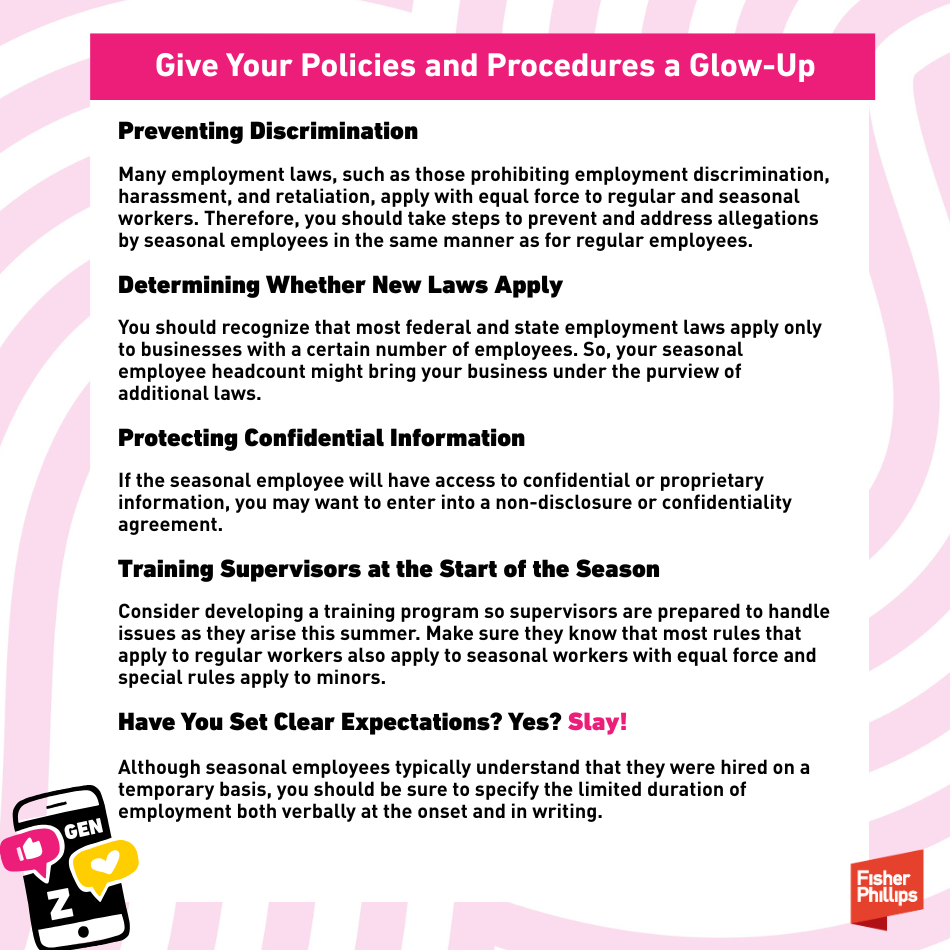
As the economy remains resilient, companies are in a battle not only to hire capable talent, but also to retain the workers that are assets to the organization. Much has been written about the impact of the Baby Boomers and Millennials in the workplace. However, what about the smaller Generation X cohort that is sometimes the forgotten middle child of the generations? While they may be outnumbered by the Millennials and Boomers, their influence has shaped US companies during years of technological advancement and corporate change. What are the characteristics of Gen X, and what do they want from their employer?
Independent
The Gen X group born between 1965-1980 was often referred to as latchkey kids. This term was used because a number of them came home alone after school because both parents worked. This fostered a sense of self discipline and autonomy. These individuals had to self-manage their own activities and make decisions based on judgment in the absence of an adult. Gen X learned not to depend on others for constant direction; they created their own outcomes.
Adaptable
Gen Xers childhood predated the internet, personal home computers, and cell phones. They had to learn evolving technology as well as embrace and master it to be successful in corporate America. From the generation that used the first cordless home phone, to commanding the world of work on a smartphone, their actions illustrate the ability to adapt, pivot, and embrace change.
Self-Reliant
This cohort has experienced two Gulf Wars, dot com bust, 9/11 tragedy, The Great Recession, and COVID. All of these events came with a great loss of jobs and retraction of the economy. Gen Xers have managed to navigate some of the most unprecedented events in history that impacted careers and livelihoods. Their resourcefulness helped them thrive and develop the expertise needed to stay relevant in the workforce in the midst of those events.
Growth and Development
Invest in Gen X workers continued growth and development. Whether it be formal classroom leadership training, conferences and seminars, or online courses, help them enhance their skill set. They already have a wealth of business acumen, so modernizing their tool kit benefits them and improves results for the organization. Most of Gen X has been working for decades, and any job can become repetitive and monotonous if skill sets become stagnant. Create a culture of learning and design training programs that address the needs of mid-career professionals.
New Projects & Meaningful Work
Invite them to lead new company projects and initiatives. In addition, consider offering Gen Xers a different role outside of their comfort zone that teaches them a new talent. They likely have a distinguished track record of tackling new assignments, so keep them energized with new leadership responsibilities. Evaluate your process for promotions. Is it based on performance data? Many in this group want to achieve the next level of success within a company. Engage in dialogue and determine what is important to them in their career trajectory.
Flexibility
Some Gen Xers want enhanced flexibility to care for children, parents, or pursue outside interests. Flexibility desires may reach beyond the ability to work from home periodically. Moreover, some may want to take on a part time role or become an independent contractor supporting their current team. Some workers may simply want more vacation days. One size does not fit all when it comes to flexibility, and people have different motivators – ask them.
Mentor Others
Every organization is engaged in succession planning as the life line for business continuity. Gen X is an irreplaceable asset of industry knowledge and expertise. Many want to mentor, teach, and help the next generation succeed in their careers. They have a command of workplace dynamics and want to impart their skills and coach new leaders to excel in the organization.
The Generation X Influence
As pivotal members of corporate work teams, Gen X is 53 million strong in the US labor force. This group is often described as autonomous but driven to make a difference and have an impact. By using different methods to engage Gen X, we can align to their values and retain them for decades.
A third of millennials have health conditions that reduce their quality of life and life expectancy, according to a new study of medical claims by the Blue Cross Blue Shield Health Index (BCBS Health Index). The report found that millennials had substantially higher diagnoses for eight of the top 10 health conditions than Generation X, and based on their current health status, millennials are more likely to be less healthy when they’re older, compared to Gen Xers. These findings are based off of a study of millennials who were between the ages of 34 and 36 in 2017 and Gen Xers who were 34 to 36 in 2014.
The biggest health differences between the two generations was the higher impact of physical conditions driven by increased cardiovascular and endocrine conditions, including diabetes.
A recent Blue Cross Blue Shield Association (BCBSA) survey found that 83% of millennials consider themselves in good or excellent health, and that 68% of millennials have a primary care physician, compared to 91% of Generation X, which is an important factor in preventative care.
“Based on these findings, we’re seeing that millennials are not seeking preventative care and it’s not only having an effect on their immediate health, but will significantly impact their long-term health as well,” said Vincent Nelson, MD, vice president, Medical Affairs for BCBSA. “With millennials on track to become the largest generation in the near future, it’s critical that they’re taking their health maintenance seriously. Our plan is to address this issue now to ensure millennials, and all Americans, take a proactive role in maintaining their health and wellbeing.”
The Blue Cross Blue Shield, The Health of America Report series, “The Health of Millennials,” examined the BCBS Health Index, a database of de-identified medical claims from more than 41 million commercially insured members of Blue Cross and Blue Shield (BCBS) companies. The findings revealed overall health begins to decline at the age of 27.
Additional findings from the study are:
To identify key drivers of millennial health and how to improve it, BCBS companies will host Millennial Health Listening Sessions across the country. Through these workshops, BCBS companies will hear from millennials, leading health care experts, employers and digital leaders on how to improve the health of millennials. Independence Blue Cross will kick-start the listening sessions by hosting the first one on April 25 in Philadelphia, Pennsylvania.
A millennial is someone who was born between 1981 and 1996, and there are nearly 73 million millennials in the U.S. right now – the second largest generation among commercially insured Americans. Gen Xers were born between 1965 and 1980.
This is the 26th study of the Blue Cross Blue Shield, The Health of America Report® series. For more information, visit https://www.bcbs.com/the-health-of-america.